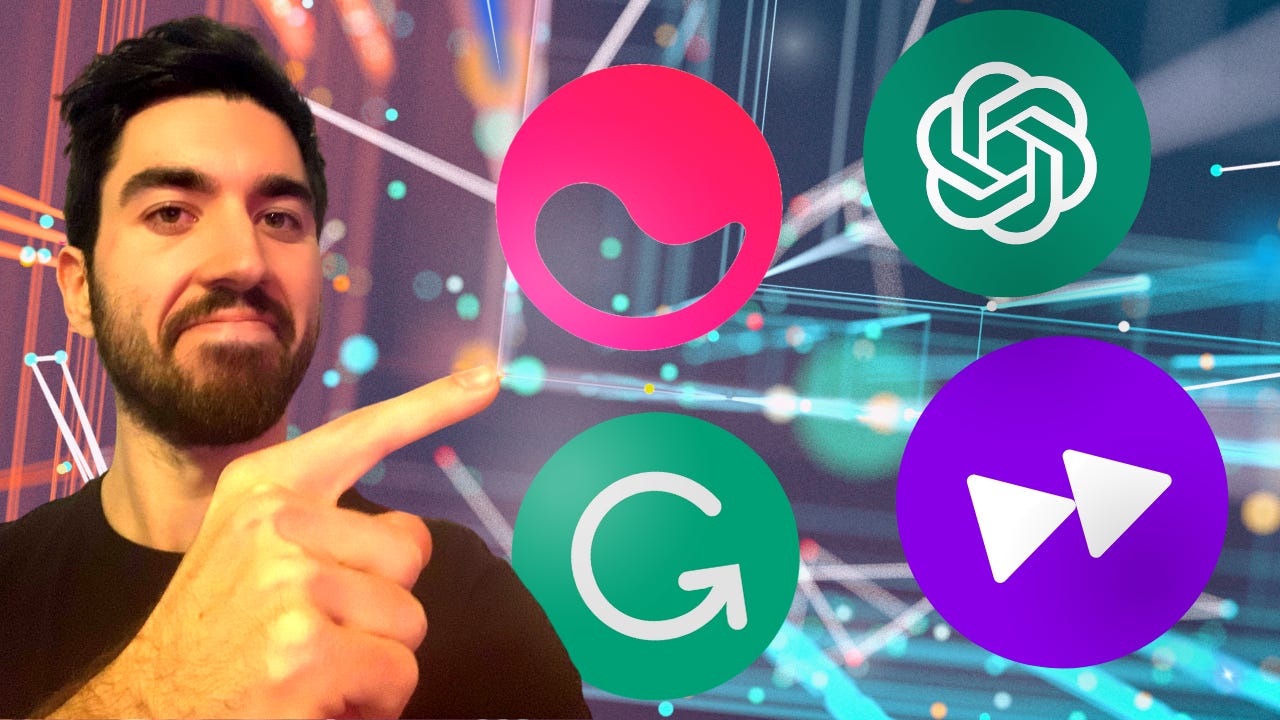These AI Tools will 10x Your Productivity!
The best AI-Powered tools for productivity, and our thoughts on this...
Good morning fellow AI enthusiast! This week's iteration focuses on productivity! While "regular" tools can definitely be helpful, these AI-powered tools have significantly improved my efficiency and results. The use of AI in these specific tools we will see was really a game changer here. This is why I highly recommend them to you all.
I also want to highlight that you should always be careful using AI-powered support and double-check the results. More details in my video and Auxane's comments in this iteration!
1️⃣ [Sponsored] Join MindOS's Free Closed Beta Launch with me!
Mindverse is a groundbreaking platform that leverages cutting-edge generative AI artificial to create customizable AI beings for sales, marketing, and customer service; "An AI Genius that Supercharges Sales and Service". They wanted to invite my audience to join the MindOS Closed Beta Product Launch (completely free) from April 18-21, open to developers, distributors, journalists, and enterprise IT teams. This looks pretty cool; I will attend the premiere on April 18, 2023, at 12:00 PM EST if you'd like to tune in too!
2️⃣ The Best AI-Powered Tools for Productivity!
Here we are fans of artificial intelligence, so I would like to share my top five productivity tools that are all AI-based. While non-AI tools can also be useful, these specific tools have significantly improved my efficiency and performance. This is why I highly recommend them to you all.
Here’s a quick tl;dr of the best tools, but I strongly invite you to watch the short video to learn more and find out even more interesting tools and why they are so cool!
ChatGPT. I had to note it. ChatGPT is amazing for many things. It’s useful to create templates for many repetitive tasks involving text.
Grammarly is just a fantastic corrector. It helps you correct your sentences live and is embedded in most text inputs from any website and even on your phone, whether you are typing a tweet, an email, or a LinkedIn post.
Cohere. I’ve had the chance to be one of the early testers being a Cohere ambassador, and it is impressive. I love being able to summarize a long article or video into a few lines. I used it myself for my own articles to create social posts since you can customize the output pretty well to get the length you want, and the summaries are better than what I usually do. They have lots of other features I talk about in the video too.
Otter.ai. Otter.ai is amazing during your remote meetings. It will automatically summarize what you talk about and split into the different topics you covered. This is incredibly useful for interviews or long meetings that cover a wide variety of topics.
mem.ai. Mem.ai has many features, but the one I most enjoy is how it automatically organizes your content. There are templates for pretty much everything, like meeting summaries.
The most useful tool is… the future! Tune in to the video to learn what I mean by that! (or read more here)
3️⃣ AI Ethics with Auxane
Hi there, fellow AI enthusiasts! Are you ready to hear about the exciting and ethical implications of using AI-powered tools for productivity? Let's dive in!
We all know that AI-powered tools, like Grammarly, ChatGPT, mem.ai, and cohere, have the potential to boost our productivity to the next level by helping with redundant tasks, or note taking. But have you ever considered the ethical implications that come with these tools?
The use of AI algorithms for productivity raises concerns about, just to name a few, privacy, bias, dependence, misuse, and accountability.
AI-powered tools can be a privacy nightmare, collecting data on our writing habits, word choices, and communication patterns, for example. But we can ensure our privacy by requiring user consent, data anonymization, and minimising data collection, such as proposed in the European General Data Protection Regulation (GDPR). Additionally, AI algorithms can perpetuate and sometimes accentuate biases that exist in society, but we can combat this by, for instance, doing due diligence in the data handling, or testing phase of the algorithm, and remedying issues if they arise when the algorithm is already accessible by the general public. On the other hand, the question of renouncing some autonomy to those tools to free up time for productivity and efficiency is to be put on the table. Considering at which point too much autonomy is given up is a case by case when it comes to productivity, but has to be asked by each individual and the organisations they belong to. Finally, misuse of such tools is related to our last point. What if someone “just” uses ChatGPT to generate the content they are supposed to create in their job? - That seems a bit far fetched, but maybe this could happen! What if someone uses cooperation tools to stalk a co-worker? Again, maybe far fetched, but misuse is usually creative! More simply, what if your boss starts using cooperation and time management shared tools in the team to micro-manage your work to a point where it becomes uncomfortable for you? Those are just a few examples coming to mind, but I’m sure there are way more ways to misuse those tools out there! Finally, who is accountable? That is the forever question when it comes to AI. If something goes right, or if something goes wrong, who should handle the consequences - not only legally, but also in the public eye?
The first solution that seems obvious is to implement responsible development practices and to reach the state of the art, with the goal to overcome these challenges and unlock the full potential of these technologies.
Let's not forget about the opportunities that come with AI-powered tools though! You know by now that I’m an optimist.
When considering individuals with disabilities, such as dyslexia or visual impairments, we can see that AI-powered tools can make communication more accessible, inclusive and efficient within teams. And by automating tedious tasks like proofreading and formatting, we can focus on more creative and innovative work. Being in a “writing-a-lot” type of job, I can tell you this is a big time save for me, especially considering that, just like Louis, I’m a french speaking native and english is my second language.
So, let's embrace the ethical opportunities that AI-powered tools offer while carefully considering the risks. By doing so, we can promote inclusivity, efficiency, innovation, and collaboration while ensuring that these technologies are used responsibly.
I wish you all a great week! - Auxane Boch (iuvenal research consultant, TUM IEAI research associate).
We are extremely grateful that the newsletter is now read by over 12'000+ incredible human beings counting our email list and LinkedIn subscribers. Feel free to reach out to contact@louisbouchard.ai with any questions or details on sponsorships. Feel free to follow our newsletter at Towards AI, sharing the most exciting news, learning resources, articles, and memes from our Discord community weekly.
Thank you for reading, and we wish you a fantastic week! Be sure to have enough rest and sleep!
We will see you next week with another amazing paper!
Louis






